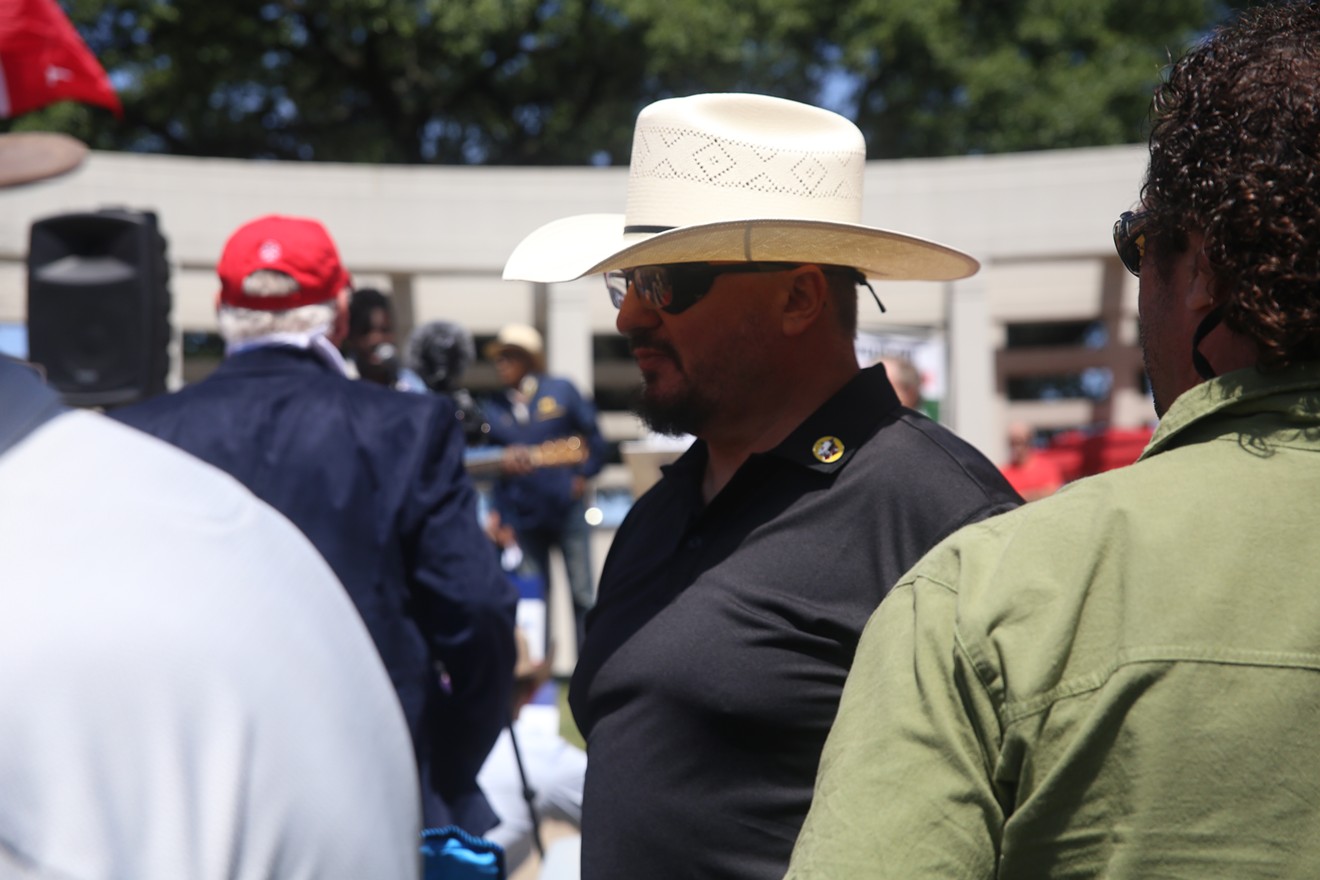One of the alleged masterminds of the Jan. 6 riot at the U.S. Capitol will stay locked up until trial, a federal judge ruled Wednesday.
Elmer Stewart Rhodes, who goes by Stewart Rhodes, is the founder of the Oath Keepers, a far-right anti-government militia. He was arrested earlier this month on the rarely used charges of seditious conspiracy, or plotting to overthrow the U.S. government by force. Ten other alleged Oath Keepers or associates are facing the same charge.
At his initial appearance in a federal court in Plano on Jan. 14, Rhodes’ attorney James Lee Bright made clear that he wanted to secure Rhodes’ release from jail ahead of his trial, which is tentatively scheduled for July this year. U.S. Attorney Leslie Brooks told U.S. Judge Kimberly Johnson that her team intended to keep him locked up while he waited for trial.
On Wednesday, the government got their way. Johnson decided to keep Rhodes in U.S. marshals' custody until his criminal trial begins later this year.
At Rhodes' initial appearance in court the week before, Rhodes' defense attorneys said they anticipated a fight between U.S. prosecutors and the militiaman's legal team regardless of the decision made about the militia leader's pretrial detention.
"If the government wins, we’ll appeal, and if he’s released, the government will most likely appeal,” Phillip Linder, one of the attorney’s on Rhodes’ defense team, told reporters last week.
Attorney James Lee Bright said after Rhodes’ initial appearance that Rhodes was not a flight risk or a danger to society. But Johnson said the maze of escape tunnels Rhodes had built in his Granbury backyard indicated that he did indeed intend to evade capture and would seek to escape U.S. authorities if released.
Johnson also pointed to a stash of unregistered cars stored in the woods near Rhodes’ home as evidence of his intentions to slip away from law enforcement at some point.
Attorneys Bright and Phillip Linder, both part of Rhodes’ legal defense team, did not respond to the Observer’s requests for comment following Wednesday’s decision.
Rhodes’ pretrial custody decision is a significant step in one of the most prominent criminal cases to come out of the investigation into the Jan. 6 riot. Though more than 700 people have been charged with criminal behavior relating to the riot, Rhodes and the other 10 recently charged are the firsts to be hit with a high-level, conspiratorial crime like seditious conspiracy.
Kellye SoRelle, a North Texas attorney, told the Observer after Rhodes’ first court appearance that Rhodes had handpicked her as his successor before his arrest. She said she's now serving as president of the Oath Keepers national organization.
SoRelle’s profile grew after she filed a lawsuit last year against every sitting member of Congress seeking to void all votes in the 2020 election, which incumbent President Donald Trump lost to President Joe Biden.
She didn't respond to the Observer’s requests for comment following Wednesday’s decision to keep Rhodes behind bars in the meantime.
The Southern Poverty Law Center, an Alabama-based watchdog that monitors hate groups, considers the Oath Keepers an anti-government organization "based on a set of baseless conspiracy theories about the federal government working to destroy Americans’ liberties."
[
{
"name": "Air - MediumRectangle - Inline Content - Mobile Display Size",
"component": "18855504",
"insertPoint": "2",
"requiredCountToDisplay": "2"
},{
"name": "Editor Picks",
"component": "17105533",
"insertPoint": "4",
"requiredCountToDisplay": "1"
},{
"name": "Inline Links",
"component": "18349797",
"insertPoint": "8th",
"startingPoint": 8,
"requiredCountToDisplay": "7",
"maxInsertions": 25
},{
"name": "Air - MediumRectangle - Combo - Inline Content",
"component": "17105532",
"insertPoint": "8th",
"startingPoint": 8,
"requiredCountToDisplay": "7",
"maxInsertions": 25
},{
"name": "Inline Links",
"component": "18349797",
"insertPoint": "8th",
"startingPoint": 12,
"requiredCountToDisplay": "11",
"maxInsertions": 25
},{
"name": "Air - Leaderboard Tower - Combo - Inline Content",
"component": "17105535",
"insertPoint": "8th",
"startingPoint": 12,
"requiredCountToDisplay": "11",
"maxInsertions": 25
}
]












